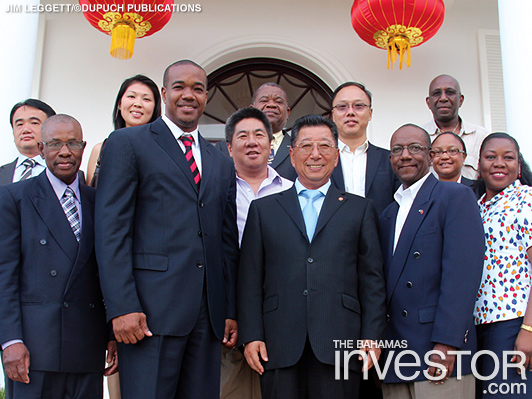| Published: Date: Updated: Author: |
The Bahamas Investor Magazine July 13, 2014 July 13, 2014 Steve Cotterill |
With an estimated 1.3 billion citizens, China is home to more people than any other country in the world. And they are getting rich.
“There is little doubt that China will become the global superpower in the next couple of decades. It is vital that we get to know China: its language, people and culture,” says Philip Simon, president of the Bahamas China Friendship Association, which celebrates its 10th anniversary this year and aims to “bridge cultural diversity through friendship and harmony.”
China’s influence as an economic heavyweight is evident throughout the world and The Bahamas has been one of many jurisdictions that has benefitted from the Asian powerhouse’s rapid growth globally. Sino-Bahamian investment totals billions of dollars and has significantly contributed to infrastructure development and the enhancement of the jurisdiction’s sports and tourism offering.
“China is getting to know us intimately,” says Simon. “It has taken an interest in our country because of the location and we are strategically very well positioned for a country looking to raise its global presence.”
Chinese Tourism
- Chinese travellers spent a record $102 billion on international tourism in 2012, a 40 per cent rise from $73 billion in 2011.
- The volume of international trips by Chinese travellers grew from 10 million in 2000 to 83 million in 2012, making it the world’s fastest-growing market.
- In 2005, China ranked seventh in international tourism expenditure, and has since successively overtaken Italy, Japan, France and the UK.
- With the 2012 surge, China leaped to first place, surpassing both top spender Germany and second largest spender the US (both close to $84 billion in 2012).
- By 2015, 100 million Chinese will travel abroad, a benchmark originally forecast for 2020.
SOURCE: United Nations World Tourism Organization (UNWTO)
The biggest single investment up to this point has come in the form of $2.5-billion worth of financing from the Ex-Im Bank of China for the Baha Mar megaresort on Cable Beach.
However, providing capital is just one element of a burgeoning relationship developing between the two nations in the field of tourism. “Connections between Baha Mar and China are very strong, not only in construction, but also in the connectivity at the highest level,” says Simon. “This will help educate the Chinese about the West and this region.”
Visa-free travel
A major step towards facilitating growth in the tourism sector came towards the end of last year when the Bahamian and Chinese governments signed an accord allowing nationals to travel between China and The Bahamas, visa free, for 30 days. The agreement came into effect February 12, 2014.
At the time of the announcement, the Ministry of Foreign Affairs and Immigration released a statement saying that the accord was “another step in strengthening already friendly relations” between the two countries.
The new agreement allows a person holding a valid diplomatic, official, service, public affairs, or ordinary passport from either country to travel to the other, visa free, for up to 30 days, but does not allow the holder to engage in gainful employment, to study, or to reside in either country.
As a result of this, Simon is optimistic that The Bahamas will see increased tourism from the Asian giant. “Tourism will increase exponentially because of the visa-waiver programme. It will open up The Bahamas to a much bigger market. Up until this point, it was only high-ranking officials or high-net-worth individuals who had any experience of this region.”
However, Simon adds, it is still a long way to travel, so Chinese tourists are likely to “package” the trip with two or more other destinations, such as North America and Cuba. “The Bahamas and Baha Mar will piggyback off trips to the US and the visa waiver speaks to strengthening the ability to do this.”
In China, the domestic tourism sector is well established and heritage tourism is a massive industry, with sites such as The Great Wall and the Forbidden City visited by millions of Chinese every year.
“The Chinese are absolutely curious about the world, the concept of tourism and travel. The size of the Chinese market is such that even










